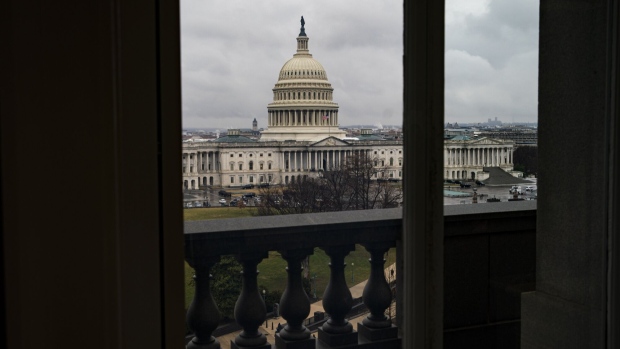Mar 24, 2023
SVB Failure Unites Democrats and Republicans in Fundraising
, Bloomberg News

(Bloomberg) -- The collapse of Silicon Valley Bank has united deeply divided lawmakers toward a singular goal: raising money off the news.
Members of Congress and presidential candidates have sent dozens of emails hitting up recipients for money and asking them to sign petitions since the Federal Deposit Insurance Corp. took over the troubled lender on March 10. The appeals for campaign cash include attacks on bank bailouts, calls for reform, plus plenty of partisan outrage.
Representative Pramila Jayapal, a Washington State progressive Democrat, took a shot at the leaders of Silicon Valley Bank, writing in an email that “They gambled, mismanaged their risk, and yet will still get off scot-free.” She also blamed Republicans for a bipartisan 2018 law that exempted mid-size banks like SVB from some of the rules imposed by an earlier massive overhaul of financial industry regulations.
Republicans, meanwhile, took aim at President Joe Biden. Senator Ron Johnson of Wisconsin told supporters that the bank crisis was caused by rising interest rates to fight inflation, which he said was triggered by massive deficit spending. The Biden administration didn’t care about the debt, he said, as he asked supporters to chip in to help retire his obligations from his 2022 campaign.
The emails’ disparate tone highlights that while lawmakers do not agree on the causes or solutions of many crises, neither party will pass up the chance to use one as a fundraising opportunity.
Attacking the bank’s bailed-out technology clients who had deposits well over the $250,000 insurance limit was a theme of several emails. Vermont Senator Bernie Sanders contrasted them with uninsured low-income workers struggling with cancer. “That’s what Martin Luther King Jr. would call ‘socialism for the rich and rugged individualism for the poor,’” Sanders wrote in an email that asked supporters to sign a petition to strengthen banking regulations.
Vivek Ramaswamy, the biotech entrepreneur running for the Republican presidential nomination, faulted crony capitalism and government intervention in the economy and pledged to end both if elected. He asked readers for $5 or more.
The first pitches hit inboxes on March 12, according to Pundit Analytics, which tracks emails, Facebook ads and social-media postings of elected officials and candidates. That was hours before the Federal Reserve, the FDIC and the Treasury Department issued a joint statement guaranteeing that Silicon Valley Bank depositors would be made whole.
Most of the emails focus on SVB, which the FDIC is now trying to sell, though a few also mention Signature Bank, another mid-size bank taken over by regulators around the same time.
The roiling of the financial world presented an opportunity for Representative Ruben Gallego, a progressive Arizona Democrat, who’s trying to unseat Senator Kyrsten Sinema, an independent, in 2024.
Among the first to send fundraising emails, Gallego attacked Sinema for supporting the 2018 regulation rollback, a measure he voted against. Sinema’s campaign declined to comment. She has said she’s taking part in a bipartisan effort “to investigate clear warning signs” that the Fed missed.
A founding member of Congress’s progressive “Squad,” New York Representative Alexandria Ocasio-Cortez also singled out the power of money in politics in a fundraising email she sent under the subject line, “The era of ‘too big to fail’ was supposed to be over.”
In her fundraising pitch, Massachusetts Senator Elizabeth Warren blamed former President Donald Trump for weakening banking regulations while touting a bill that would end the exemption for mid-size banks — a measure she introduced the next day.
©2023 Bloomberg L.P.







